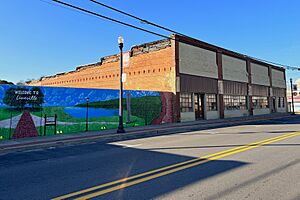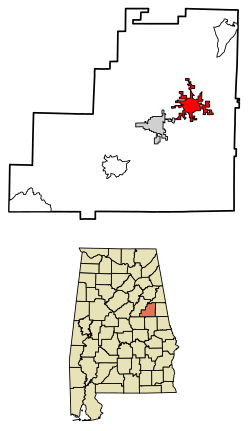Lineville, Alabama facts for kids
Quick facts for kids
Lineville
|
|||
|---|---|---|---|

Lineville in 2022
|
|||
|
|||

Location of Lineville in Clay County, Alabama.
|
|||
| Country | United States | ||
| State | Alabama | ||
| County | Clay | ||
| Area | |||
| • Total | 9.74 sq mi (25.23 km2) | ||
| • Land | 9.67 sq mi (25.04 km2) | ||
| • Water | 0.07 sq mi (0.19 km2) | ||
| Elevation | 1,056 ft (322 m) | ||
| Population
(2020)
|
|||
| • Total | 2,489 | ||
| • Density | 257.45/sq mi (99.40/km2) | ||
| Time zone | UTC-6 (Central (CST)) | ||
| • Summer (DST) | UTC-5 (CDT) | ||
| ZIP code |
36266
|
||
| Area code(s) | 256 | ||
| FIPS code | 01-43264 | ||
| GNIS feature ID | 0159953 | ||
Lineville is a city located in Clay County, Alabama, in the United States. It's a cool place with a rich history! According to the 2020 census, about 2,489 people live there.
Contents
Lineville's History: A Journey Through Time
Lineville has a long and interesting past. Long ago, Native Americans lived in this area. After the Creek Indian War of 1813, they had to move away.
Early Settlers and the Town's Beginning
The first European settlers were William and Thomas Lundie. Their small community became known as Lundie's Cross Roads. This was because a trading post opened there in the 1830s. It served pioneers and miners looking for gold.
In 1856, Lundie's Cross Roads changed its name to County Line. This name likely came from the Baptist Church, which was founded in 1848. It was located right on the border between Talladega and Randolph counties.
That same year, a post office opened in County Line. Schools also joined together, and farmers started growing corn and cotton to sell.
How Lineville Got Its Name
The town of Lineville was built on the dividing line between Talladega and Randolph Counties. This is why it was named Lineville!
The Crooked Creek Baptist Church, later called Lineville Baptist Church, was first built in 1839. It moved a few times before settling in the town of Lineville around 1863. The church was also used for the first Circuit Court in Clay County in 1867.
Farming and New Industries
In the 1920s, the chicken business became very popular in Clay County. Reverend Secelar Claxton Ray showed farmers how raising chickens could help them earn more money. He started the Goodwill Poultry Farm and Hatchery.
He even used old houses from local graphite mines to build his hatchery and chicken houses. This helped many local farmers and the community.
Lineville During the Civil War and Beyond
During the Civil War, many men from the Lineville area fought. After the war, the area faced tough times. Clay County was officially formed in 1866.
The town's name officially became Lineville in 1870. It even served as the temporary government seat for Clay County.
Growth and Modernization
Lineville continued to grow. A newspaper started in 1884. In 1898, Lineville officially became an incorporated town. Graphite mining became a big industry, and a National Bank opened.
A college, Lineville College, opened in 1891. In 1907, the first railroad came to Lineville, helping the timber industry grow. High schools also opened. By 1917, Lineville had water and electricity! The Lineville water tank is now a historic landmark.
Lineville's Location and Surroundings
Lineville is located in the northeast part of Clay County. Its exact coordinates are 33°18'45.122" North and 85°45'9.274" West.
Main Roads and Travel
Several main roads run through Lineville. These include Alabama State Route 9, Alabama State Route 48, and Alabama State Route 49.
- AL-9 goes through downtown Lineville. It leads northeast to Heflin and southwest to Ashland, which is the county seat.
- AL-48 starts in the eastern part of the city and goes east to Wedowee.
- AL-49 also runs through downtown. It leads north to Cheaha State Park and south to Goldville.
Size and Natural Features
The city covers about 23.3 square kilometers (9.0 square miles). Most of this area is land, with a small part being water.
Lineville was named because it was on the border between Talladega and Randolph counties. Alabama's highest point, Mount Cheaha, is only about 18 miles north of Lineville!
Lineville's Climate
Lineville has a humid subtropical climate. This means it usually has hot, humid summers and mild winters. It gets a good amount of rain throughout the year.
| Climate data for Lineville, 1991–2020 simulated normals (1050 ft elevation) | |||||||||||||
|---|---|---|---|---|---|---|---|---|---|---|---|---|---|
| Month | Jan | Feb | Mar | Apr | May | Jun | Jul | Aug | Sep | Oct | Nov | Dec | Year |
| Mean daily maximum °F (°C) | 53.8 (12.1) |
57.4 (14.1) |
65.5 (18.6) |
73.0 (22.8) |
79.9 (26.6) |
86.0 (30.0) |
88.7 (31.5) |
88.0 (31.1) |
83.3 (28.5) |
74.5 (23.6) |
64.2 (17.9) |
55.9 (13.3) |
72.5 (22.5) |
| Daily mean °F (°C) | 42.6 (5.9) |
45.9 (7.7) |
52.7 (11.5) |
60.3 (15.7) |
68.0 (20.0) |
74.8 (23.8) |
78.1 (25.6) |
77.5 (25.3) |
72.0 (22.2) |
61.9 (16.6) |
51.6 (10.9) |
45.1 (7.3) |
60.9 (16.0) |
| Mean daily minimum °F (°C) | 31.6 (−0.2) |
34.5 (1.4) |
40.1 (4.5) |
47.3 (8.5) |
55.9 (13.3) |
63.9 (17.7) |
67.6 (19.8) |
67.1 (19.5) |
60.8 (16.0) |
49.3 (9.6) |
39.2 (4.0) |
34.3 (1.3) |
49.3 (9.6) |
| Average precipitation inches (mm) | 5.52 (140.17) |
5.30 (134.57) |
5.65 (143.39) |
4.89 (124.24) |
4.63 (117.69) |
4.86 (123.54) |
4.62 (117.31) |
4.67 (118.51) |
3.96 (100.52) |
3.39 (86.01) |
4.84 (122.96) |
5.78 (146.82) |
58.11 (1,475.73) |
| Average dew point °F (°C) | 33.4 (0.8) |
36.1 (2.3) |
41.5 (5.3) |
49.1 (9.5) |
58.8 (14.9) |
66.2 (19.0) |
69.4 (20.8) |
68.9 (20.5) |
63.7 (17.6) |
53.1 (11.7) |
42.4 (5.8) |
37.0 (2.8) |
51.6 (10.9) |
| Source: Prism Climate Group | |||||||||||||
People of Lineville: Demographics and Community
Lineville is home to a diverse community. Understanding the population helps us learn more about the city.
| Historical population | |||
|---|---|---|---|
| Census | Pop. | %± | |
| 1890 | 234 | — | |
| 1900 | 211 | −9.8% | |
| 1910 | 1,053 | 399.1% | |
| 1920 | 1,507 | 43.1% | |
| 1930 | 1,329 | −11.8% | |
| 1940 | 1,300 | −2.2% | |
| 1950 | 1,548 | 19.1% | |
| 1960 | 1,612 | 4.1% | |
| 1970 | 1,984 | 23.1% | |
| 1980 | 2,257 | 13.8% | |
| 1990 | 2,394 | 6.1% | |
| 2000 | 2,401 | 0.3% | |
| 2010 | 2,395 | −0.2% | |
| 2020 | 2,489 | 3.9% | |
| U.S. Decennial Census 2013 Estimate |
|||
Population in 2020
| Race | Num. | Perc. |
|---|---|---|
| White (non-Hispanic) | 1,418 | 56.97% |
| Black or African American (non-Hispanic) | 819 | 32.9% |
| Native American | 5 | 0.2% |
| Asian | 2 | 0.08% |
| Pacific Islander | 2 | 0.08% |
| Other/Mixed | 120 | 4.82% |
| Hispanic or Latino | 123 | 4.94% |
In 2020, there were 2,489 people living in Lineville. These people lived in 899 households, with 600 of them being families.
Population in 2010
Back in 2010, Lineville had 2,395 people. There were 967 households and 655 families. The population density was about 268 people per square mile.
The city's population was made up of different groups. About 58.6% were White, and 36.9% were Black or African American. A small percentage were Native American, Asian, or Pacific Islander. About 4.6% of the population identified as Hispanic or Latino.
In 2010, about 28.3% of households had children under 18. The average household had 2.37 people. The average family had 2.89 people.
The median age in Lineville was 40.9 years old. This means half the people were younger than 40.9, and half were older.
Education in Lineville: Learning and Growth
Lineville has a history of focusing on education.
Lineville Academy started in 1856. Soon after, the first red school house was built. Another school was added later. The Lineville Institute opened in 1883 but closed a year later.
Lineville College was a college for white students. It was founded in Lineville in 1890 and closed in 1903.
In 1917, a new building replaced the old Springhill Black School. It was named Clay County Training School. During the Great Depression in 1929, many families and businesses in Lineville faced difficulties. However, a new factory opened in Lineville in 1946, and a new hospital was built in 1949.
Famous People from Lineville
Lineville has been home to some notable individuals:
- Robert Daniel Carmichael: A famous mathematician. He is known for "Carmichael numbers." He attended Lineville College.
- Byron Lavoy Cockrell: A rocket scientist and engineer.
- Joe F. Edwards, Jr.: An astronaut who traveled to space.
- Flem B. Walker, Jr.: A Three-Star General in the U.S. Army.
Images for kids
-
Lineville Post Office (ZIP code: 36266)
See also
 In Spanish: Lineville (Alabama) para niños
In Spanish: Lineville (Alabama) para niños
 | Bayard Rustin |
 | Jeannette Carter |
 | Jeremiah A. Brown |









